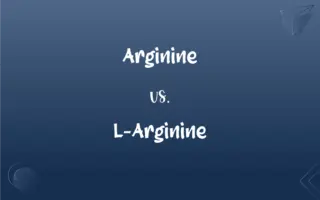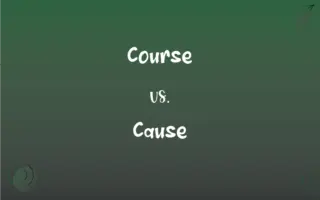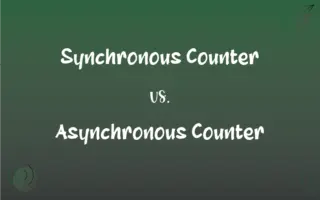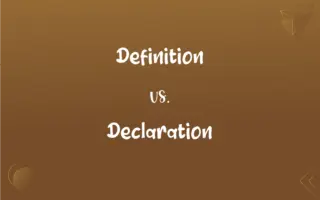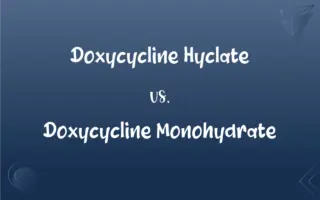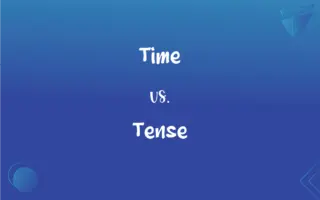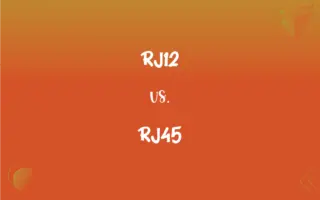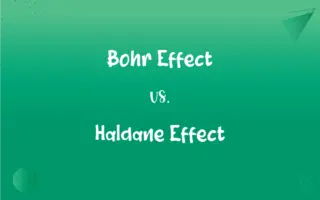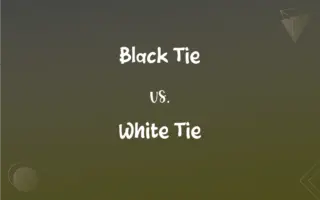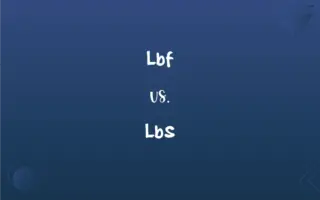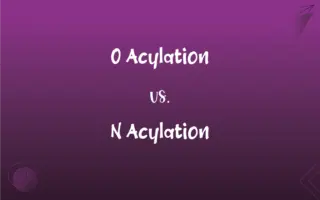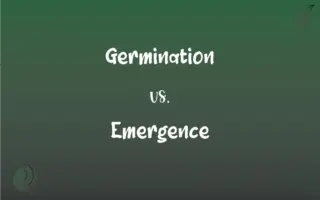Conclusion vs. Premise: What's the Difference?
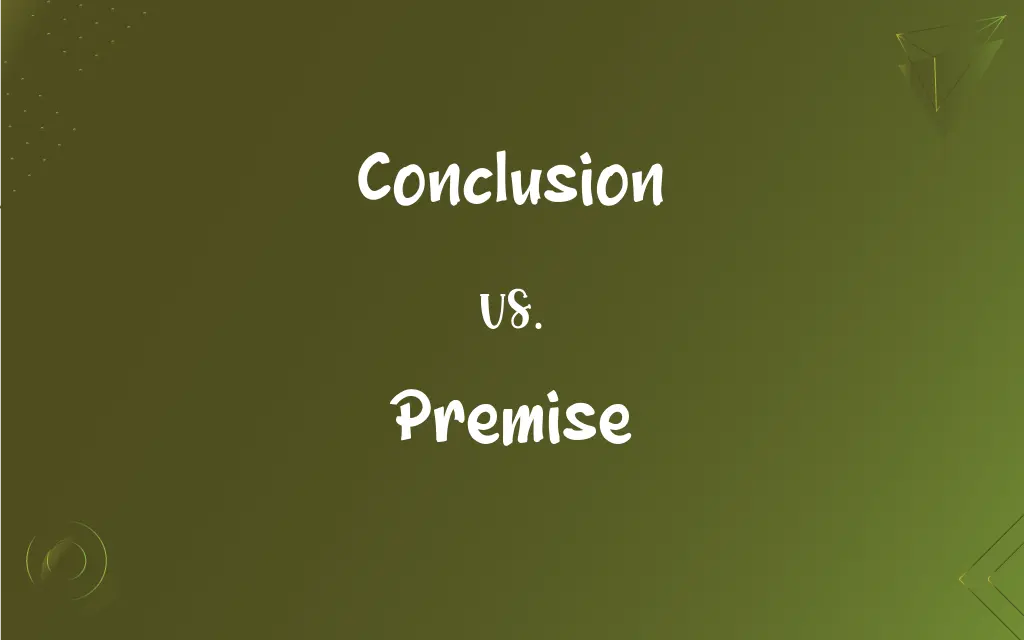
Conclusion and Premise Definitions
Conclusion
The close or last part; the end or finish
The conclusion of the festivities.
Premise
A proposition upon which an argument is based or from which a conclusion is drawn.
Conclusion
The result or outcome of an act or process
What was the conclusion of all these efforts?.
Premise
One of the propositions in a deductive argument.
Conclusion
A judgment or decision reached after deliberation.
ADVERTISEMENT
Premise
Either the major or the minor proposition of a syllogism, from which the conclusion is drawn.
Conclusion
A final arrangement or settlement, as of a treaty.
Premise
Land, the buildings on it, or both the land and the buildings on it.
Conclusion
(Law) The formal closing of a legal complaint or pleading.
Premise
A building or particular portion of a building.
ADVERTISEMENT
Conclusion
A proposition that follows from the premises of a formal proof, for instance from the major and minor premises of a syllogism.
Premise
(Law) The part of a deed that states the details of the conveyance of the property.
Conclusion
The proposition concluded from one or more premises; a deduction.
Premise
To provide a basis for; base
"The American Revolution had been premised on a tacit bargain that regional conflicts would be subordinated to the need for unity among the states" (Ron Chernow).
Conclusion
The end, finish, close or last part of something.
Premise
To state or assume as a proposition in an argument.
Conclusion
The outcome or result of a process or act.
Premise
To state in advance as an introduction or explanation.
Conclusion
A decision reached after careful thought.
The board has come to the conclusion that the proposed takeover would not be in the interest of our shareholders.
Premise
A proposition antecedently supposed or proved; something previously stated or assumed as the basis of further argument; a condition; a supposition.
Conclusion
(logic) In an argument or syllogism, the proposition that follows as a necessary consequence of the premises.
Premise
(logic) Any of the first propositions of a syllogism, from which the conclusion is deduced.
Conclusion
(obsolete) An experiment, or something from which a conclusion may be drawn.
Premise
Matters previously stated or set forth; especially, that part in the beginning of a deed, the office of which is to express the grantor and grantee, and the land or thing granted or conveyed, and all that precedes the habendum; the thing demised or granted.
Conclusion
(law) The end or close of a pleading, for example, the formal ending of an indictment, "against the peace", etc.
Premise
A piece of real estate; a building and its adjuncts.
Trespass on another’s premises
Conclusion
(law) An estoppel or bar by which a person is held to a particular position.
Premise
(authorship) The fundamental concept that drives the plot of a film or other story.
Conclusion
The last part of anything; close; termination; end.
A fluorish of trumpets announced the conclusion of the contest.
Premise
To state or assume something as a proposition to an argument.
Conclusion
Final decision; determination; result.
And the conclusion is, she shall be thine.
Premise
To make a premise.
Conclusion
Any inference or result of reasoning.
Premise
To set forth beforehand, or as introductory to the main subject; to offer previously, as something to explain or aid in understanding what follows.
Conclusion
The inferred proposition of a syllogism; the necessary consequence of the conditions asserted in two related propositions called premises. See Syllogism.
He granted him both the major and minor, but denied him the conclusion.
Premise
To send before the time, or beforehand; hence, to cause to be before something else; to employ previously.
Conclusion
Drawing of inferences.
Your wife Octavia, with her modest eyesAnd still conclusion.
Premise
A proposition antecedently supposed or proved; something previously stated or assumed as the basis of further argument; a condition; a supposition.
The premises observed,Thy will by my performance shall be served.
Conclusion
An experiment, or something from which a conclusion may be drawn.
We practice likewise all conclusions of grafting and inoculating.
Premise
Either of the first two propositions of a syllogism, from which the conclusion is drawn.
While the premises stand firm, it is impossible to shake the conclusion.
Conclusion
The end or close of a pleading, e.g., the formal ending of an indictment, "against the peace," etc.
Like the famous ape,To try conclusions, in the basket creep.
Premise
Matters previously stated or set forth; esp., that part in the beginning of a deed, the office of which is to express the grantor and grantee, and the land or thing granted or conveyed, and all that precedes the habendum; the thing demised or granted.
Conclusion
A position or opinion or judgment reached after consideration;
A decision unfavorable to the opposition
His conclusion took the evidence into account
Satisfied with the panel's determination
Premise
A piece of real estate; a building and its adjuncts; as, to lease premises; to trespass on another's premises.
Conclusion
An intuitive assumption;
Jump to a conclusion
Premise
To send before the time, or beforehand; hence, to cause to be before something else; to employ previously.
The premised flames of the last day.
If venesection and a cathartic be premised.
Conclusion
The temporal end; the concluding time;
The stopping point of each round was signaled by a bell
The market was up at the finish
They were playing better at the close of the season
Premise
To set forth beforehand, or as introductory to the main subject; to offer previously, as something to explain or aid in understanding what follows; especially, to lay down premises or first propositions, on which rest the subsequent reasonings.
I premise these particulars that the reader may know that I enter upon it as a very ungrateful task.
Conclusion
Event whose occurrence ends something;
His death marked the ending of an era
When these final episodes are broadcast it will be the finish of the show
Premise
To make a premise; to set forth something as a premise.
Conclusion
The proposition arrived at by logical reasoning (such as the proposition that must follow from the major and minor premises of a syllogism)
Premise
A statement that is assumed to be true and from which a conclusion can be drawn;
On the assumption that he has been injured we can infer that he will not to play
Conclusion
The act of ending something;
The termination of the agreement
Premise
Set forth beforehand, often as an explanation;
He premised these remarks so that his readers might understand
Conclusion
A final settlement;
The conclusion of a business deal
The conclusion of the peace treaty
Premise
Furnish with a preface or introduction;
She always precedes her lectures with a joke
He prefaced his lecture with a critical remark about the institution
Conclusion
The last section of a communication;
In conclusion I want to say...
Premise
Take something as preexisting and given
Conclusion
The act of making up your mind about something;
The burden of decision was his
He drew his conclusions quickly

























